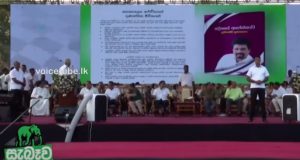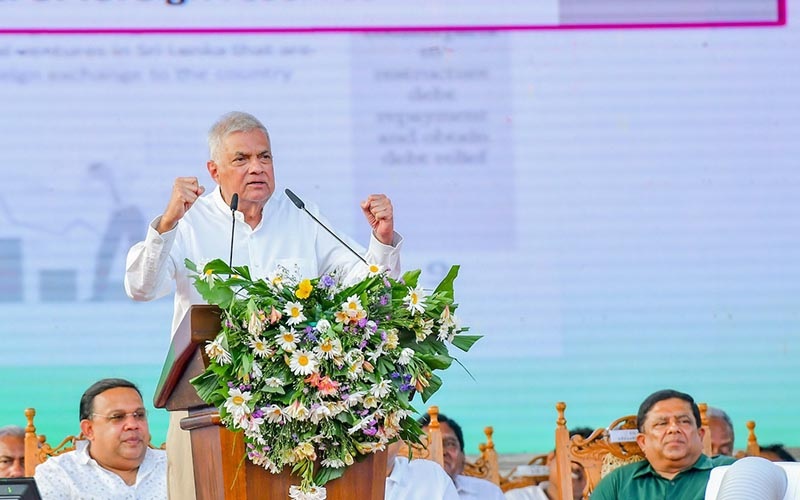President Ranil Wickremesinghe, who has fully immersed himself in the election campaign, took a swipe at opposition politicians Anura Kumara Dissayanaka and Sajith Premadasa by showing a video of how they faced resistance at the Galle Face Aragala. He mentioned that Sajith Premadasa declined the presidency due to ongoing protests, and Anura Kumara Dissanayaka did not come forward.
He went on to say that while opposition politicians were being chased away, he was nearby at the Shangrilla Hotel attending the wedding of Minister Ranjith Simbala Pitiya’s daughter. Wickramasinghe mentioned that although the protesters knew he was close by, they never protested. However, he did not mention that his house was burned down days later.

At the meeting held in Kandy, he said that AKD and his group had been giving empty and unrealistic promises for a very long time.
Painting a Rosy Picture
Ranil Wickramasinghe has been busy painting a rosy picture of the economy and arguing that the gloom is moving away under his leadership.
“By temporarily removing the Parate law, we’ve protected medium-scale industrialists. This week, we’ve managed to offer relief on electricity bills. Looking ahead, we aim to exempt items like books, school supplies, and health equipment from the VAT list and further reduce the VAT rate in the future,” President Wickremesinghe told Parliament in a statement on the current economic situation.
“After shrinking for six quarters until mid-2023, our economy is rebounding and is expected to grow by 2-3% this year. In 2023, we increased state revenue by over 50%, achieved a primary account surplus, and settled all overdue contractor payments from the last 3–4 years.
In the first eight months of 2022, state-owned enterprises lost Rs. 720 billion. By 2023, we turned that into a Rs. 313 billion profit. Despite business closures due to the economic downturn, the recovery has sparked new ventures. Company registrations increased from 17,819 in 2022 to 22,376 in 2023, with 1,995 new companies registered in January 2024.

we’ve removed import restrictions, except for private motor vehicles. Thanks to the primary surplus, the value of the US dollar against the rupee, which was 363 last year, has depreciated to 308 as of yesterday, strengthening the rupee.
A nation that was once confined indoors, struggling to afford emergency fuel for transportation or lacking cooking gas, now travels freely. The once dire need for basic medication, such as paracetamol for a sick child at night, has almost completely reversed, showing the tangible benefits of our economic progress.
Some doubt this economic progress, attributing it to paused loan payments, and argue that repaying debts will revive our difficulties, dismissing our gains as temporary. However, such skepticism is baseless. Discussions are ongoing about restructuring all loans, both domestic and international.
With great reluctance, we imposed VAT, given that our economic challenges left us no other choice. Enduring this temporary pain was essential for the greater good. This move raised state revenue to nearly 11% of GDP, affirming our debt repayment ability. Consequently, the economic revival strengthened the rupee, reducing the cost of imported goods, including fuel.
Printing Money
We’re restructuring government institutions to hand them over to investors. We’ve expanded the tax net, increasing the total number of tax files to over 1 million in 2023. This is a 130% increase. We’ve completely halted printing money and are advancing legal reforms to strengthen and modernize our legal framework, systems, and processes, enhancing public financial and economic management.
We’ve published the Governance Diagnostic Report, a first for South Asia, taking steps to enhance governance and tackle corruption risks.
Our measures have enabled facilities and concessions for many citizens. Through “Urumaya,” two million families will gain land ownership, reclaiming lost ancestral lands. We’ve also tripled social security spending.







